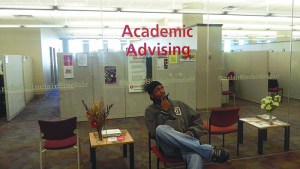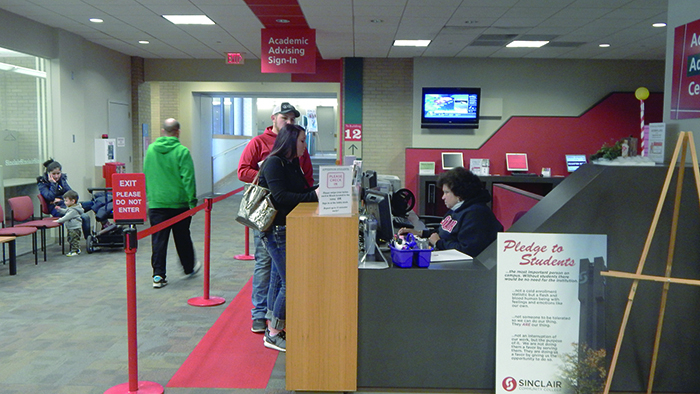 The Academic Advising center at Sinclair provides support for new and returning students who need guidance with the academic side of college, according to Andy Runyon, chief academic advising officer.
The Academic Advising center at Sinclair provides support for new and returning students who need guidance with the academic side of college, according to Andy Runyon, chief academic advising officer.
“It’s to support students in a lot of ways—working on deciding what kind of program the students want to be in, even if they are undecided,” Runyon said. “I boil it all down to helping students be successful, but that’s all of us.”
Runyon is responsible for the Dayton campus advising center, which consists of 40 advisors, along with a leadership team of advising managers. He oversees the center, as well as ensuring advising sessions are running smoothly with advisors and students.
“Each career community has an advising manager—someone who advises students day to day, but who is also supervising advisors in that area,” Runyon said. “We also have a manager over advisors who work with students who have gotten into academic challenges.”
Students are recommended to meet with an advisor in order to make sure they are meeting their academic needs for their majors.
“We can work with undecided students and we can work with students who know what their major is, but they need assistance figuring out what courses they need to take and in what order,” Runyon said.
Advisors not only help students register for classes or help choose a major, but Runyon also said they could guide students through policies, as well as helping them focus on a “fresh start.”
“We also help students who get into academic probation or dismissal, trying to help them and point them to resources that will help them be successful—help them navigate through policies, such as the fresh start policy or how to get readmitted after dismissal,” Runyon said.
However, Runyon said there is a fine line between advising and counseling. Advisors are trained to look for signs with students who may be showing stress from personal issues.
“We try to train advisors on what kind of questions to see whether a student has enough time to take a given course load,” Runyon said. “They do some very basic kinds of personal interaction to see where the challenges are.”
Runyon said if it goes much further than basic personal problems, then they can refer students to counseling.
Colleges are complex, according to Runyon. There are a lot of requirements for programs and majors in order to make sure students are getting the proper training for their future careers.
 “I’ve gotten a lot of help from [academic advising]. There’s a lot of stuff I didn’t know about the music program, so they’ve showed me where to go for everything,” Corinne Wampler, Music major said.”I agree, they’ve helped a lot,” Sharon Galeneo, Music Major added.
“I’ve gotten a lot of help from [academic advising]. There’s a lot of stuff I didn’t know about the music program, so they’ve showed me where to go for everything,” Corinne Wampler, Music major said.”I agree, they’ve helped a lot,” Sharon Galeneo, Music Major added.
To make sure students are familiar with navigating through the curriculum, as well as understanding Sinclair’s policies, Runyon said academic advising is a great connection to have at Sinclair.
“To do it by yourself can be a real challenge, and you can mess yourself up pretty bad if you aren’t careful,” Runyon said. “There are ways to get off track and out of sequence and our advisors can help you.”
It is possible to graduate without using the resources that the center provides, but Runyon doesn’t suggest taking that route. However, he said that students could plan out their MAP and then look it over with their advisor, in order to be proactive.
“We have students who choose not to make use of our services, but over 90 percent of our new services in fall term did come into advising,” Runyon said. “Once they get that plan, we call it a MAP, My Academic Plan, then they know what to take—we can provide a lot of help making sure they are on the right track.”
 The center is moving into “caseload management,” meaning each student is assigned a specific advisor, so they are consistently meeting with the same person in order to achieve familiarity.
The center is moving into “caseload management,” meaning each student is assigned a specific advisor, so they are consistently meeting with the same person in order to achieve familiarity.
One of the biggest changes academic advising is embracing is a new system to document data in order to help students stay on track, while predicting challenges the students may face that could cause conflict, according to Runyon.
“We are working with a software vendor to be able to look at all of our data, even things like when was the last time you swiped for parking or went down to the cafeteria, and then use that data to say ‘oh it doesn’t look like you’re coming to campus like you used to, is there something that we can do to help;’ we call it data analytics,” Runyon said.
Communication is key to ensure that students are getting the most out of their advising sessions. Runyon said it’s important that advisors know the intentions of a student, and that they have the latest information about a student.
Julio Camacho, Liberal Arts, and Jerett Berger, Mechanical Engineering agree the center points students in the right direction, but it’s important to plan ahead.
Runyon said that advising has changed their schedule to make more time throughout the day for students. Advising sessions are mainly by appointment only, in order for longer sessions and to cut down on the number of errors.
The number one goal for academic advising is to make sure students are successful. In order to make that happen, students should be open about their struggles and progress, according to Runyon. It’s a two-way street essentially.
“Be straight up with your advisor. If you have a challenge and you don’t think you’re going to pass something, talking with your advisor about it is a good first start,” Runyon said.
Gabrielle Sharp
Executive Editor

